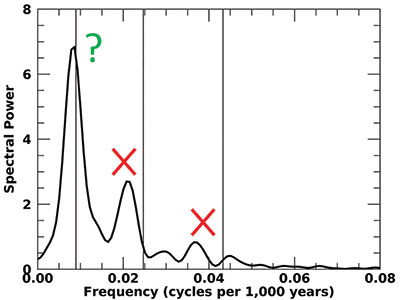Purpose
The Milankovitch, or astronomical, theory holds that the timing of Ice Ages is controlled by slow changes in Earth’s orbital and rotational motions that vary the way sunlight falls on the earth. A famous 1976 paper in Science titled “Variations in the Earth’s Orbit: Pacemaker of the Ice Ages” seemed to confirm the theory.1
An arbitrary “wiggly” pattern can be constructed by adding together, in just the right combination, waves of different frequencies and amplitudes. A graph called a power spectrum shows the frequencies of the waves that make the biggest contribution to such a pattern. If the astronomical theory is correct, one might expect power spectra of climate data to show strong peaks at frequencies predicted by the astronomical theory. This was the case in the 1976 paper and was seen as strong evidence for the theory.
These results depended critically upon an assumed age of 700,000 years for the most recent reversal of Earth’s magnetic field. Yet, conventional scientists now claim this magnetic reversal occurred 780,000 years ago.2 What did this age revision do to the evidence for the Milankovitch theory?
Methods
I was unable to find the original, unaltered climate data used in the Pacemaker paper. So, using the figures in the paper, I very carefully reconstructed these data sets. I used the magnetic reversal to assign ages to the data the same way the Pacemaker authors did. I then successfully reproduced the power spectra in the Pacemaker paper. Finally, I redid these calculations using the new age assignment of 780,000 years.
Results

Agreement with Milankovitch expectations was greatly reduced (see Figure 1).3 Details are found in the referenced articles, which contain links to my original technical papers. Scientists have made other changes to the Pacemaker climate data since 1976, so I also analyzed the most recent versions of these data I could find. In this case, agreement with the Milankovitch theory was even worse.4
I also found circumstantial evidence that conventional scientists had become aware of this problem in 1996 and had tried to quietly “fix” it, apparently without telling either the larger scientific community or the general public.5
Impact
The Milankovitch theory is routinely used to assign ages to ice cores and seafloor sediments. The acceptance of the theory has led many scientists to conclude that our climate is inherently unstable, requiring drastic action to fight global warming. Many Christians assume that Milankovitch-embracing scientists are hard-nosed empiricists who would gladly inform them if evidence for the theory were lacking.
My research shows this simply isn’t the case. It also demonstrates that hundreds of uniformitarian age assignments are in doubt, and it calls into question an important argument for catastrophic climate change.6 Although conventional scientists have ignored these results, they seem to have been a great encouragement to many Christians. One person even told ICR that this Milankovitch research played a role in his becoming a Christian and a young-earth creationist.
References
- Hays, J. D., J. Imbrie, and N. J. Shackleton. 1976. Variations in the Earth’s Orbit: Pacemaker of the Ice Ages. Science. 194 (4270): 1121-1132.
- Hebert, J. 2016. Milankovitch Meltdown: Toppling an Iconic Old-Earth Argument, Part 1. Acts & Facts. 45 (11): 10–13.
- Hebert, J. 2016. Milankovitch Meltdown: Toppling an Iconic Old-Earth Argument, Part 2. Acts & Facts. 45 (12): 10–13.
- Hebert, J. More Problems with Iconic Milankovitch Paper. Creation Science Update. Posted on ICR.org July 13, 2018, accessed February 6, 2023.
- Hebert, J. Physics Today Article Ignores Monster Milankovitch Problem. Creation Science Update. Posted on ICR.org May 24, 2020, accessed February 6, 2023.
- Hebert, J. 2017. Milankovitch Meltdown: Toppling an Iconic Old-Earth Argument, Part 3. Acts & Facts. 46 (1): 10–13.
* Dr. Hebert is Research Scientist at the Institute for Creation Research and earned his Ph.D. in physics from the University of Texas at Dallas.












